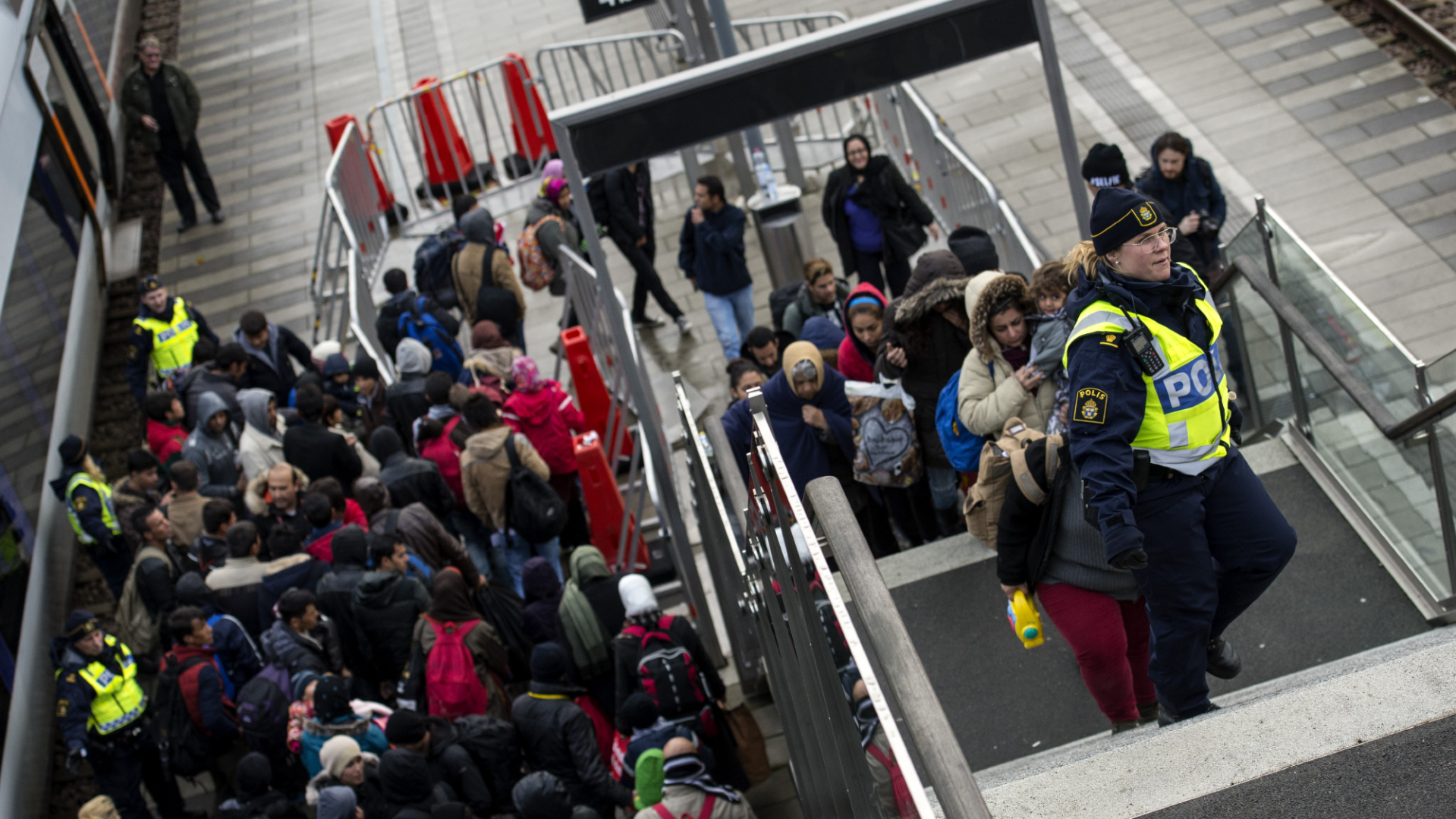Joakim Lundqvist never thought he would be pastor to hundreds of people named Muhammad.
And yet, in the wake of Europe’s influx of asylum seekers from conflict zones in Muslim-majority countries including Syria, Afghanistan, and Iraq, he and his church, Livets Ord (Word of Life) in Uppsala, Sweden, saw their own dramatic increase in newcomers—many of them Muslim.
And many of them interested to learn about Jesus.
In the last ten years, Lundqvist said Word of Life has seen more than 900 Muslims convert to Christianity and 450 graduate from the charismatic megachurch’s Bible school.
Founded in 1983 by Ulf Ekman, the church has grown into a significant force within the charismatic movement, with thousands of members in Uppsala and international centers around Europe and in Russia, the Middle East, and Asia.
As debates around immigration in Europe have resurged in recent days, rhetoric remains emotionally charged across the continent. Populist voices continue to frame migrants—particularly Muslims—as a threat to European identity. Mainstream political leaders urge more nuanced dialogue with an appreciation for multiculturalism and respect for the tradition of human rights.
Lundqvist takes a different approach. He says the whole situation might just be “God doing a new thing.”
Though he personally feels there have been issues with Europe’s immigration and integration systems, he told CT that he also believes “inside every problem is a possibility. And the possibility here is the mass conversion of Muslims in Europe.”
A decade after a record 1.3 million migrants arrived in Europe in 2015, churches like Lundqvist’s have undergone massive changes, many of them welcoming asylum seekers and new converts from countries where missionary efforts have often been frustrated.
Lundqvist—who now serves at a Word of Life church in Baton Rouge, Louisiana, and another in Dallas, Texas, but continues to preach regularly in Uppsala—told CT that when migrant and refugee arrivals to the EU were at their peak, his pastoral team received a “prophetic word.”
Rather than complain about what they saw as “liberal immigration laws,” they felt called to embrace a “new wave of missions,” seeing “an opportunity for the Gospel” in the midst of a humanitarian crisis. Sharing the vision with their members, Lundqvist and other pastors got to work. No strategy was disregarded, no method not given a chance. They put up “Refugees Welcome” signs and hosted parties where they made gospel presentations. They engaged in street evangelism, targeting newcomers and the neighborhoods where they lived.
They also pioneered brazen mission initiatives in Muslim-majority countries. In one particularly controversial move, Lundqvist announced in July 2016 that the church would use drones to drop thousands of “pill box”-sized Bibles over territory controlled by the Islamic State in Syria and Iraq. The tactic was criticized because of drones’ association with violent military intervention, but Word of Life’s mission pastor defended the move, comparing it to Bible smuggling during the heights of the Cold War.
The efforts, for all the controversy they courted, were effective, according to Lundqvist. “We found it much easier to share Jesus with Muslims than with everyday Swedes,” the pastor said, “to the point that 75 percent of those who accept Christ at our church are former Muslims.”
Across Europe, church leaders and missiologists say a notable number of Muslim migrants and refugees have embraced Christianity over the last decade. Explanations of the conversions run the gambit: some attribute it all to God, some to cynical attempts to game the asylum-system, and some to sociological factors, like the need to belong.
Reliable statistics are hard to come by. According to Duane Alexander Miller, an Anglican priest and scholar of contextualization and conversion at the Protestant Faculty of Theology in Madrid, some estimates may be exaggerated. Nevertheless, the numbers suggest something significant is happening.
“We are seeing more conversions from Islam to Christianity in the last 60 years than in all the years since the birth of Islam,” Miller said.
Even so, Miller urges caution. Not only are there questions around the reliability of the numbers cited and conversions in the opposite direction, but there are also other challenges, he says.
Discipleship, spiritual growth, and church rendition are often difficult. Attracting a large number of converts at a church is no guarantee that those people will continue in the faith in five, 10, or 50 years.
“Getting a person to convert or be baptized can be, relatively speaking, quite easy,” Miller said.
The strangeness of the new community, combined with pressures from family and friends, can take a toll on new converts. To Christians tempted to celebrate when they see big numbers or hear stories like Word of Life’s, Miller cautions, “It’s not a time to pat ourselves on the back; the work has just begun.”
Some scholars have also been critical of the conversions, pointing out that while Word of Life and churches like it present themselves as welcoming, they can also cultivate anti-Muslim attitudes.
Emma Sundström, a doctoral student in theology at Uppsala University, studies the conversion narratives—testimonies—of Muslims who have become Lutherans.
The testimonies are not all the same, she said, but vary a good bit by context. In East Africa, for example, converts often talk about the power of Christianity, miraculous healings, and how they saw prayers answered. In Europe, she heard far less about the supernatural.
“You get this sort of different view that conversion is about church being a place where they felt welcomed and found a home,” she said.
That is sometimes paired with aggressive criticism of Islam. This makes sense, Sundström said, as converts want to make it clear why they changed from one religion to another. On the other hand, it can also be because of the language coming from churches like Word of Life. She worries the social implications of rhetoric that makes it seem like all Muslims are bad.
Word of Life has faced criticism for this. The church’s founder once declared Islam an “anti-religion” filled with violence and hatred. Though Muslims are monotheists, he claimed it is nothing like Christianity and Judaism. Ekman even said that Quran has no concept of peace or forgiveness—claims that Islamic experts and Muslims point out is simply untrue.
The church’s publishing arm has also released a book portraying Islam as a global threat and raising alarms that, because of declining birthrates, European Christians going to be replaced.
Word of Life has distanced itself from the publications, saying the church does not endorse every line it prints, and the congregation does not all agree on every issue.
Word of Life’s conversions have also been called into question, even by migration authorities arguing that conversions may be more about cultural assimilation or procuring asylum than genuine religious transformation.
As Word of Life continues its work in Uppsala, it remains a testament to the complexities and challenges of religious outreach in a multicultural Europe.
Miller defends the church and others like it. He said Christians working to convert Muslims is one of the complexities of multiculturalism, but people of faith should not have to shirk from the religious responsibility to evangelize.
“I’m not a polemicist, but Christians should, in good conscience, have the freedom to claim that Christianity is better than Islam,” said Miller. “They should do what they feel called to. It’s good to have a variety of approaches.”
The church maintains their mission is rooted in love. Lundqvist said Christians must be up front with what they believe, even if it offends. At the same time, he believes love will overcome any issues people might have with him or the Uppsala church.
“I think that’s the road,” Lundqvist said. “Be full of love for God and for these people. Then, even controversial elements will be less of a problem.”












